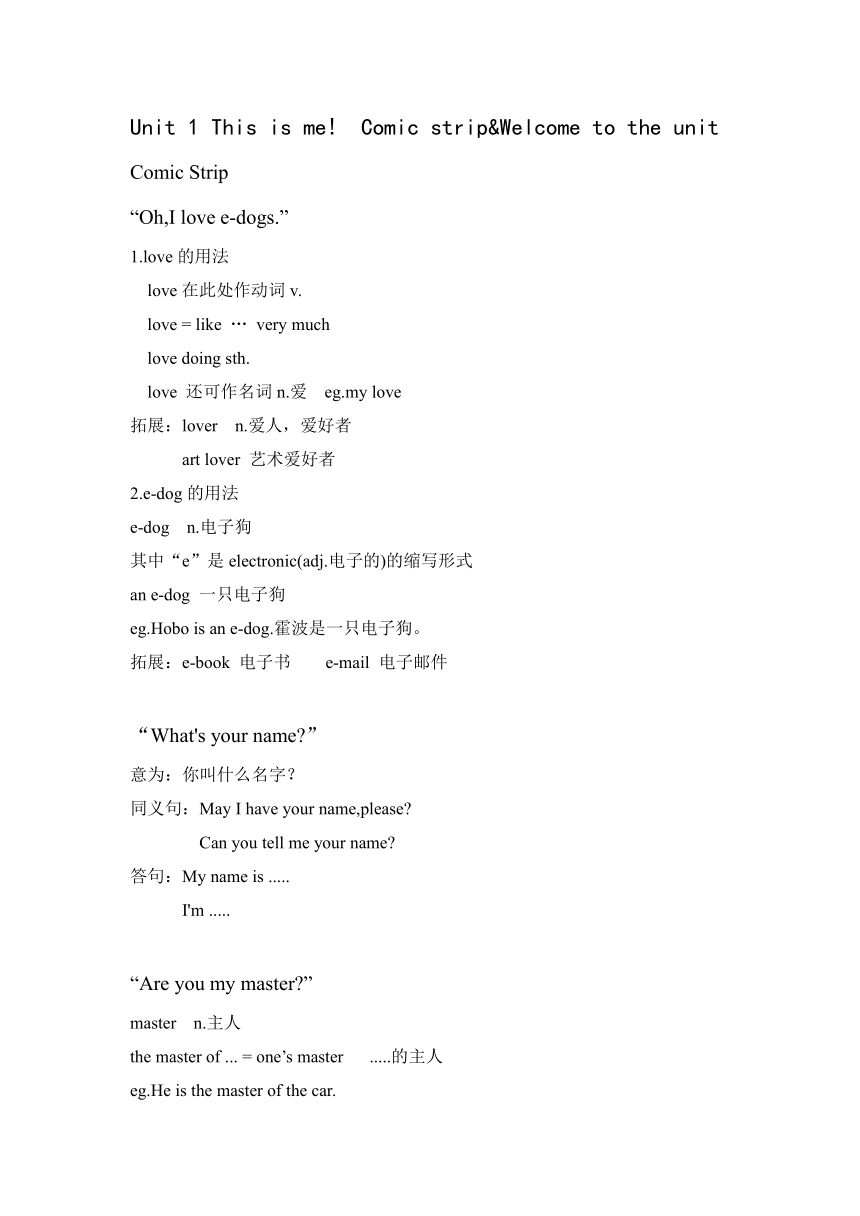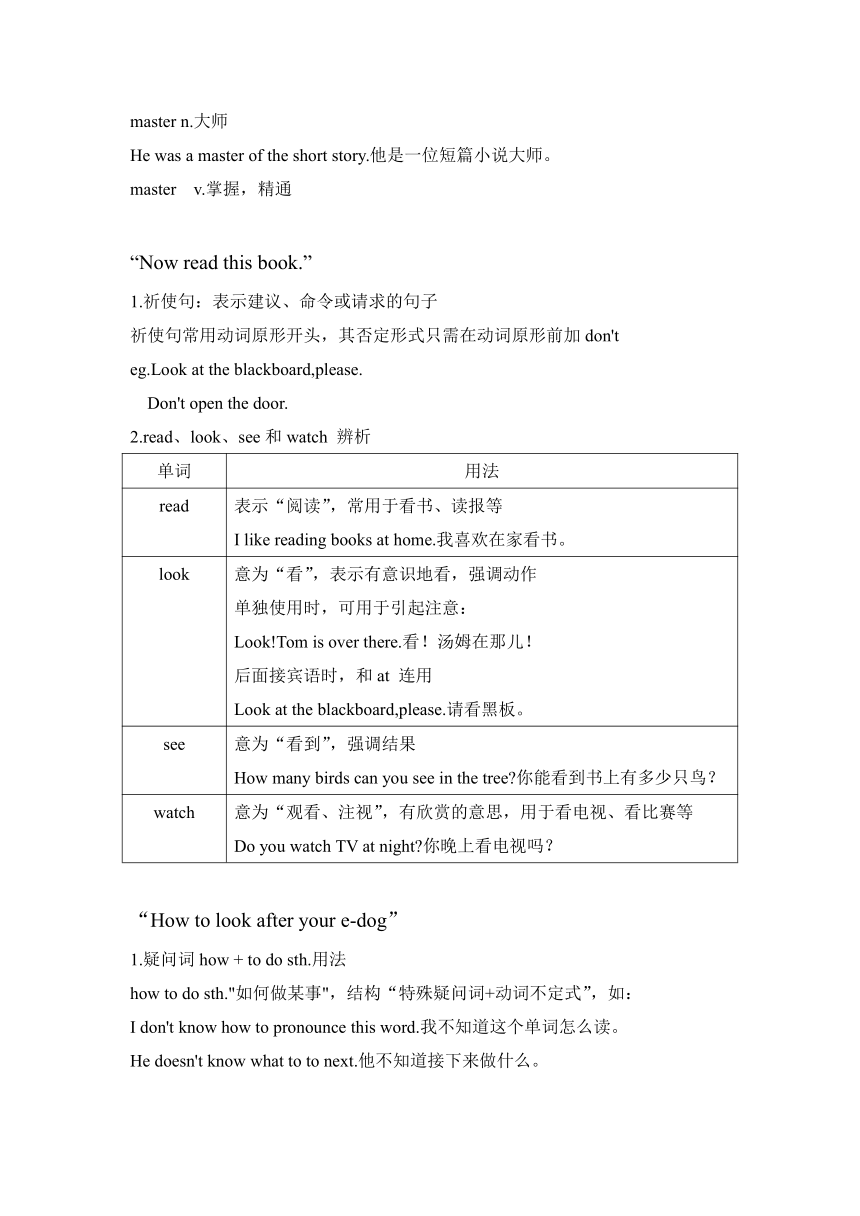Unit 1 This is me(comic strip&Welcome to the unit)知识点及对应练习(无答案)
文档属性
| 名称 | Unit 1 This is me(comic strip&Welcome to the unit)知识点及对应练习(无答案) |  | |
| 格式 | docx | ||
| 文件大小 | 18.4KB | ||
| 资源类型 | 教案 | ||
| 版本资源 | 牛津译林版 | ||
| 科目 | 英语 | ||
| 更新时间 | 2021-07-15 13:08:07 | ||
图片预览


文档简介
Unit
1
This
is
me!
Comic
strip&Welcome
to
the
unit
Comic
Strip
“Oh,I
love
e-dogs.”
1.love的用法
love在此处作动词v.
love
=
like
…
very
much
love
doing
sth.
love
还可作名词n.爱
eg.my
love
拓展:lover
n.爱人,爱好者
art
lover
艺术爱好者
2.e-dog的用法
e-dog
n.电子狗
其中“e”是electronic(adj.电子的)的缩写形式
an
e-dog
一只电子狗
eg.Hobo
is
an
e-dog.霍波是一只电子狗。
拓展:e-book
电子书
e-mail
电子邮件
“What's
your
name?”
意为:你叫什么名字?
同义句:May
I
have
your
name,please?
Can
you
tell
me
your
name?
答句:My
name
is
.....
I'm
.....
“Are
you
my
master?”
master
n.主人
the
master
of
...
=
one’s
master
.....的主人
eg.He
is
the
master
of
the
car.
master
n.大师
He
was
a
master
of
the
short
story.他是一位短篇小说大师。
master
v.掌握,精通
“Now
read
this
book.”
1.祈使句:表示建议、命令或请求的句子
祈使句常用动词原形开头,其否定形式只需在动词原形前加don't
eg.Look
at
the
blackboard,please.
Don't
open
the
door.
2.read、look、see和watch
辨析
单词
用法
read
表示“阅读”,常用于看书、读报等
I
like
reading
books
at
home.我喜欢在家看书。
look
意为“看”,表示有意识地看,强调动作
单独使用时,可用于引起注意:
Look!Tom
is
over
there.看!汤姆在那儿!
后面接宾语时,和at
连用
Look
at
the
blackboard,please.请看黑板。
see
意为“看到”,强调结果
How
many
birds
can
you
see
in
the
tree?你能看到书上有多少只鸟?
watch
意为“观看、注视”,有欣赏的意思,用于看电视、看比赛等
Do
you
watch
TV
at
night?你晚上看电视吗?
“How
to
look
after
your
e-dog”
1.疑问词how
+
to
do
sth.用法
how
to
do
sth."如何做某事",结构“特殊疑问词+动词不定式”,如:
I
don't
know
how
to
pronounce
this
word.我不知道这个单词怎么读。
He
doesn't
know
what
to
to
next.他不知道接下来做什么。
2.look
after的用法
look
after
=
take
care
of
“照料、照顾”
look
after
...
well
=
take
good
care
of
...
照顾好...
eg.Please
look
after
him.
=
Please
take
care
of
him.
关于look的短语
look
like
看起来像
look
the
same看起来一样
look
up查找
look
forward
to
doing
sth.期待着做某事
look
through浏览
look
for
寻找
look
out当心
look
out
of
朝...外看
Welcome
to
the
unit
"Good
morning."、"Good
afternoon."、"Good
evening."&"Good
night."
"Good
morning"“早上好”,是人们早上或上午见面时常用的问候语
当对方说"Good
morning",你的回答也是"Good
morning"
同样,下午和晚上问候别人用"Good
afternoon"
"Good
evening"
晚安"Good
night"
Good
evening
&
Good
night
Good
evening.晚上好(见面用语)
Good
night.
晚安(告别用语)
"Nice
to
meet
you."
"Nice
to
meet
you."是"It’s
nice
to
meet
you."的省略句。
Nice
to
meet
you.
=
Glad
to
meet
you.
课堂练习
一、单项选择
(
)1.早晨你在上学的路上遇到了朋友小明,你对他说:______
A.Goodbye!
B.Good
morning!
C.Nice
to
meet
you!
D.Good
afternoon!
(
)2.(大连市中考)
______
e-dog
is
not
_____
real(真正的)
dog.
A.A;a
B.An;a
C.A;an
D./;a
(
)3.Are
_______
master?
A.you
me
B.you're
my
C.you
my
D.your
me
(
)4.—Are
you
Eddie?
—________.
Yes,I'm
B.Yes,I'm
not
C.No,I
not
D.Yes,I
am
(
)5.—Nice
to
meet
you,Millie!
—_______,Jill!
A.Hello
B.Yes,I
am
C.Good
morning
D.Nice
to
meet
you
too
(
)6.His
sisters
often
______
books
in
the
library
at
weekends.
A.look
B.see
C.read
D.watch
(
)7.John’s
mother
is
ill.He
has
to
_________
her
at
home.
A.look
at
B.look
for
C.look
over
D.look
after
(
)8.Eddie
has
_______
e-dog.He
is
the
master
of
_____
e-dog.
A.a;a
B.an;the
C.a;the
D.the;an
(
)9.This
is
my
_____
day
at
Suzhou
No.1
Middle
School.
A.the
second
B.two
C.first
D.the
first
(
)10.—Hi,Millie.This
is
my
sister,Sandy.—__________.
Are
you
Sandy?
B.All
right,Sandy.
C.Hi,Sandy.Nice
to
meet
you.
D.Sandy?Thank
you
very
much.
二、根据句意及汉语提示写单词。
1.Good
___________(下午),boys
and
girls.
2.They
like
listening
to
music
in
the
____________(晚上).
3.The
boy
likes
to
play
with
his
________(电子狗).
4.He
is
the
________(主人)
of
the
pet
dog.
5.I'm
new
here.And
I
don't
know
all
your
________(名字).
三、用括号内所给单词的正确形式填空。
1.What's
_______(you)
name?
2._______(be)
you
a
Chinese
teacher?
3.Please
________(read)
the
book
to
me.
4.It
is
very
nice
_______
(meet)
you
here.
5.Do
you
know
how
___________(look)
after
a
baby
well?
6.Please
look
at
the
boy
in
dark
blue
in
this
photo.This
is
______(I).
7.These
bikes
are
my
____________(classmate).
8.The
black
dog
runs
to
its
__________(master),Lucy
and
Lily.
四.句型转换
1.Hello!I'm
Daming.(改为同义句)
Hello!______
_______
is
Daming.
2.My
name
is
Kitty.(对划线部分提问)
_______
______
your
name?
3.I
am
your
teacher.(改为一般疑问句)
________
_______
my
teacher?
4.My
father
is
a
doctor
in
a
hospital.(改为否定句)
My
father
_____
_____
a
doctor
in
a
hospital.
5.Are
you
the
master
of
the
house?(分别作肯定和否定回答)
Yes,_______
______./No,_______
_______.
6.Please
read
this
book.(改为否定句)
Please
______
______
this
book.
1
This
is
me!
Comic
strip&Welcome
to
the
unit
Comic
Strip
“Oh,I
love
e-dogs.”
1.love的用法
love在此处作动词v.
love
=
like
…
very
much
love
doing
sth.
love
还可作名词n.爱
eg.my
love
拓展:lover
n.爱人,爱好者
art
lover
艺术爱好者
2.e-dog的用法
e-dog
n.电子狗
其中“e”是electronic(adj.电子的)的缩写形式
an
e-dog
一只电子狗
eg.Hobo
is
an
e-dog.霍波是一只电子狗。
拓展:e-book
电子书
电子邮件
“What's
your
name?”
意为:你叫什么名字?
同义句:May
I
have
your
name,please?
Can
you
tell
me
your
name?
答句:My
name
is
.....
I'm
.....
“Are
you
my
master?”
master
n.主人
the
master
of
...
=
one’s
master
.....的主人
eg.He
is
the
master
of
the
car.
master
n.大师
He
was
a
master
of
the
short
story.他是一位短篇小说大师。
master
v.掌握,精通
“Now
read
this
book.”
1.祈使句:表示建议、命令或请求的句子
祈使句常用动词原形开头,其否定形式只需在动词原形前加don't
eg.Look
at
the
blackboard,please.
Don't
open
the
door.
2.read、look、see和watch
辨析
单词
用法
read
表示“阅读”,常用于看书、读报等
I
like
reading
books
at
home.我喜欢在家看书。
look
意为“看”,表示有意识地看,强调动作
单独使用时,可用于引起注意:
Look!Tom
is
over
there.看!汤姆在那儿!
后面接宾语时,和at
连用
Look
at
the
blackboard,please.请看黑板。
see
意为“看到”,强调结果
How
many
birds
can
you
see
in
the
tree?你能看到书上有多少只鸟?
watch
意为“观看、注视”,有欣赏的意思,用于看电视、看比赛等
Do
you
watch
TV
at
night?你晚上看电视吗?
“How
to
look
after
your
e-dog”
1.疑问词how
+
to
do
sth.用法
how
to
do
sth."如何做某事",结构“特殊疑问词+动词不定式”,如:
I
don't
know
how
to
pronounce
this
word.我不知道这个单词怎么读。
He
doesn't
know
what
to
to
next.他不知道接下来做什么。
2.look
after的用法
look
after
=
take
care
of
“照料、照顾”
look
after
...
well
=
take
good
care
of
...
照顾好...
eg.Please
look
after
him.
=
Please
take
care
of
him.
关于look的短语
look
like
看起来像
look
the
same看起来一样
look
up查找
look
forward
to
doing
sth.期待着做某事
look
through浏览
look
for
寻找
look
out当心
look
out
of
朝...外看
Welcome
to
the
unit
"Good
morning."、"Good
afternoon."、"Good
evening."&"Good
night."
"Good
morning"“早上好”,是人们早上或上午见面时常用的问候语
当对方说"Good
morning",你的回答也是"Good
morning"
同样,下午和晚上问候别人用"Good
afternoon"
"Good
evening"
晚安"Good
night"
Good
evening
&
Good
night
Good
evening.晚上好(见面用语)
Good
night.
晚安(告别用语)
"Nice
to
meet
you."
"Nice
to
meet
you."是"It’s
nice
to
meet
you."的省略句。
Nice
to
meet
you.
=
Glad
to
meet
you.
课堂练习
一、单项选择
(
)1.早晨你在上学的路上遇到了朋友小明,你对他说:______
A.Goodbye!
B.Good
morning!
C.Nice
to
meet
you!
D.Good
afternoon!
(
)2.(大连市中考)
______
e-dog
is
not
_____
real(真正的)
dog.
A.A;a
B.An;a
C.A;an
D./;a
(
)3.Are
_______
master?
A.you
me
B.you're
my
C.you
my
D.your
me
(
)4.—Are
you
Eddie?
—________.
Yes,I'm
B.Yes,I'm
not
C.No,I
not
D.Yes,I
am
(
)5.—Nice
to
meet
you,Millie!
—_______,Jill!
A.Hello
B.Yes,I
am
C.Good
morning
D.Nice
to
meet
you
too
(
)6.His
sisters
often
______
books
in
the
library
at
weekends.
A.look
B.see
C.read
D.watch
(
)7.John’s
mother
is
ill.He
has
to
_________
her
at
home.
A.look
at
B.look
for
C.look
over
D.look
after
(
)8.Eddie
has
_______
e-dog.He
is
the
master
of
_____
e-dog.
A.a;a
B.an;the
C.a;the
D.the;an
(
)9.This
is
my
_____
day
at
Suzhou
No.1
Middle
School.
A.the
second
B.two
C.first
D.the
first
(
)10.—Hi,Millie.This
is
my
sister,Sandy.—__________.
Are
you
Sandy?
B.All
right,Sandy.
C.Hi,Sandy.Nice
to
meet
you.
D.Sandy?Thank
you
very
much.
二、根据句意及汉语提示写单词。
1.Good
___________(下午),boys
and
girls.
2.They
like
listening
to
music
in
the
____________(晚上).
3.The
boy
likes
to
play
with
his
________(电子狗).
4.He
is
the
________(主人)
of
the
pet
dog.
5.I'm
new
here.And
I
don't
know
all
your
________(名字).
三、用括号内所给单词的正确形式填空。
1.What's
_______(you)
name?
2._______(be)
you
a
Chinese
teacher?
3.Please
________(read)
the
book
to
me.
4.It
is
very
nice
_______
(meet)
you
here.
5.Do
you
know
how
___________(look)
after
a
baby
well?
6.Please
look
at
the
boy
in
dark
blue
in
this
photo.This
is
______(I).
7.These
bikes
are
my
____________(classmate).
8.The
black
dog
runs
to
its
__________(master),Lucy
and
Lily.
四.句型转换
1.Hello!I'm
Daming.(改为同义句)
Hello!______
_______
is
Daming.
2.My
name
is
Kitty.(对划线部分提问)
_______
______
your
name?
3.I
am
your
teacher.(改为一般疑问句)
________
_______
my
teacher?
4.My
father
is
a
doctor
in
a
hospital.(改为否定句)
My
father
_____
_____
a
doctor
in
a
hospital.
5.Are
you
the
master
of
the
house?(分别作肯定和否定回答)
Yes,_______
______./No,_______
_______.
6.Please
read
this
book.(改为否定句)
Please
______
______
this
book.
同课章节目录
- 预备课程
- Lesson 1 Nice to meet you !
- Lesson 2 A happy family
- Lesson 3 A nice school
- Lesson 4 You look cool !
- Lesson 5 Wonderful things
- Lesson 6 Have nice food
- Lesson 7 Enjoy our days
- Lesson 8 Let's have fun !
- Unit 1 This is me
- Unit 2 Let's play sports
- Unit 3 Welcome to our school
- Unit 4 My day
- Unit 5 Let’s celebrate
- Unit 6 Food and lifestyle
- Unit 7 Shopping
- Unit 8 Fashion
